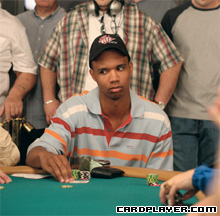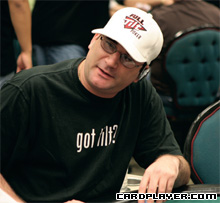
The news that the U.S. wasn't just kidding around with the whole crackdown on online poker (as defined in the recently signed Unlawful Internet Gambling Act) took many British online players by surprise. It seems that a wilful denial of the determination of the government to stifle "the American pastime" in its online incarnation was being practised by a whole bunch of European players, most of whom had grown complacent with (and some of whom had grown their bankrolls mainly from) the large numbers of U.S. players keeping their tables full through the night.
To those who make their living from online cash games, the player pool looks set to shrivel, and with it the ease of game selection. Watch for the now invisible "player counter" on some of the previously gigantic sites - not wanting to draw attention to the shrunken numbers, and leaving the count out altogether is the most telling sign that something big has happened. Given that the sites that have not already capitulated have a 270-day period to implement the new legislation, are the UK players who are responsible for panicky blogs and the air of nostalgia already surrounding the "online boom" correct in assuming that the Internet landscape will be changed permanently, and for the worse?



Well, strictly speaking, playing online is not illegal; the problem is that people tend to take the path of least resistance, including poker players, and the recreational players in America aren't the ones who will be looking hard for loopholes. If British players balk at the idea of having to play their European counterparts, who, rightly or wrongly, seem to be thought of by most here as tougher than their regular opponents, they'll just have to get used to the idea of everyone from their table originating in Stockholm. I asked a few online pros whether they were thinking about dusting off their CVs and looking for a new vocation, and received a resounding "No" in response. However, interestingly, several mentioned that they were considering live play more. Despite the obvious setbacks involved in moving from the Net to brick-and-mortar cardrooms - the inability to multitable, fewer hands per hour, the danger of minds honed to the fast-paced online style becoming bored - the worry over the state of online poker has convinced some that that is the way to go. After all, there have been quite a few successful transitions between the very different worlds of online cash games and live tournaments recently in the UK.
None have been more successful than Roland De Wolfe, winner of the
EPT Dublin, who adds a new PT-suffixed title to his already impressive record this year. Well, it has been the last couple of years, in fact; having secured the
WPT Paris Championship in 2005, he became an instant fixture on the tournament circuit he'd covered for a while as a poker correspondent for
Inside Edge magazine. I like to think that he remembers what it's like to cover deep-stack events, as his all-or-nothing style and chatty nature make for entertaining watching for those of us on the rail. And, clearly, it's a successful formula in the high-stakes tournament world - although, having said that, he is as likely to be out in the first level as battling it out heads up with Juha Helppi, a la Paris.
De Wolfe started playing at a young age via the experimental home-game route; "wild cards and stuff" at the back of snooker halls became online practise, which became high-stakes no-limit cash games, with a sideline in affiliate management. In between these steps, he took a journalism course in Brighton, and found his way onto the PartyPoker cruise and into the money in a couple of live festival events (in his hometown London's Gutshot Club and Victoria Casino). He said of those early years, "I didn't know what I was doing, but I thought I was pretty good." Playing the local £50 freezeout or the
WPT at Bellagio, he still displays an unwavering confidence that can only be an asset when combined with an approachable manner and a realistic approach to tournaments; I've seen him bubble to a two-outer and just shrug, saying, "If you don't like outdraws, you shouldn't play poker." As a cash-game player, it makes sense that he finds the deeper-stack, longer-clock events more suited to his style, and I am sure the relative freedom of speech found around the table outside the UK (in the States, especially) suits his continually-talk-at-you approach down to the ground.
Speaking of America, he's now to be found in one of those grey FullTilt hoodies, a sure sign that he's either built up a lot of frequent player points or is now a sponsored player, having joined the ranks of Phil Ivey, Mike Matusow, Howard Lederer, et al. His third-place finish (and $1 million cash) in a
WPT event (to which he was awarded entry for winning the event in France) must have pushed him even more clearly into the spotlight, making him a great candidate for its new European arm of pros. However, when he made an appearance in the Gutshot (his old haunt back when people were keener to sit with him in a cash game), he was wearing a natty suit rather than the traditional sportswear of a sponsored player.

I have no idea whether, like Patrik Antonius, De Wolfe has his sights on a house in Vegas, but as a highly visible ambassador for the UK, he's surely going to pop up all around the European circuit that he seemed set to embark upon back when he was just talking about poker a lot. I would be interested to know what he thinks of the new online landscape taking shape currently, inasmuch as his period of greatest development in poker appears to have taken place online against the players he rates highest, "big Scandinavian players." So, he's probably not as worried about the situation as others in Britain, but then again, most of us didn't just win our second major competition at the age of 27, becoming the first player to win championship events of both the "W" and "E" varieties.
 Jen Mason is part of BlondePoker.com. She is responsible for its live tournament coverage in the UK and abroad.
Jen Mason is part of BlondePoker.com. She is responsible for its live tournament coverage in the UK and abroad.







 The news that the U.S. wasn't just kidding around with the whole crackdown on online poker (as defined in the recently signed Unlawful Internet Gambling Act) took many British online players by surprise. It seems that a wilful denial of the determination of the government to stifle "the American pastime" in its online incarnation was being practised by a whole bunch of European players, most of whom had grown complacent with (and some of whom had grown their bankrolls mainly from) the large numbers of U.S. players keeping their tables full through the night.
The news that the U.S. wasn't just kidding around with the whole crackdown on online poker (as defined in the recently signed Unlawful Internet Gambling Act) took many British online players by surprise. It seems that a wilful denial of the determination of the government to stifle "the American pastime" in its online incarnation was being practised by a whole bunch of European players, most of whom had grown complacent with (and some of whom had grown their bankrolls mainly from) the large numbers of U.S. players keeping their tables full through the night.

 Well, strictly speaking, playing online is not illegal; the problem is that people tend to take the path of least resistance, including poker players, and the recreational players in America aren't the ones who will be looking hard for loopholes. If British players balk at the idea of having to play their European counterparts, who, rightly or wrongly, seem to be thought of by most here as tougher than their regular opponents, they'll just have to get used to the idea of everyone from their table originating in Stockholm. I asked a few online pros whether they were thinking about dusting off their CVs and looking for a new vocation, and received a resounding "No" in response. However, interestingly, several mentioned that they were considering live play more. Despite the obvious setbacks involved in moving from the Net to brick-and-mortar cardrooms - the inability to multitable, fewer hands per hour, the danger of minds honed to the fast-paced online style becoming bored - the worry over the state of online poker has convinced some that that is the way to go. After all, there have been quite a few successful transitions between the very different worlds of online cash games and live tournaments recently in the UK.
Well, strictly speaking, playing online is not illegal; the problem is that people tend to take the path of least resistance, including poker players, and the recreational players in America aren't the ones who will be looking hard for loopholes. If British players balk at the idea of having to play their European counterparts, who, rightly or wrongly, seem to be thought of by most here as tougher than their regular opponents, they'll just have to get used to the idea of everyone from their table originating in Stockholm. I asked a few online pros whether they were thinking about dusting off their CVs and looking for a new vocation, and received a resounding "No" in response. However, interestingly, several mentioned that they were considering live play more. Despite the obvious setbacks involved in moving from the Net to brick-and-mortar cardrooms - the inability to multitable, fewer hands per hour, the danger of minds honed to the fast-paced online style becoming bored - the worry over the state of online poker has convinced some that that is the way to go. After all, there have been quite a few successful transitions between the very different worlds of online cash games and live tournaments recently in the UK. I have no idea whether, like Patrik Antonius, De Wolfe has his sights on a house in Vegas, but as a highly visible ambassador for the UK, he's surely going to pop up all around the European circuit that he seemed set to embark upon back when he was just talking about poker a lot. I would be interested to know what he thinks of the new online landscape taking shape currently, inasmuch as his period of greatest development in poker appears to have taken place online against the players he rates highest, "big Scandinavian players." So, he's probably not as worried about the situation as others in Britain, but then again, most of us didn't just win our second major competition at the age of 27, becoming the first player to win championship events of both the "W" and "E" varieties.
I have no idea whether, like Patrik Antonius, De Wolfe has his sights on a house in Vegas, but as a highly visible ambassador for the UK, he's surely going to pop up all around the European circuit that he seemed set to embark upon back when he was just talking about poker a lot. I would be interested to know what he thinks of the new online landscape taking shape currently, inasmuch as his period of greatest development in poker appears to have taken place online against the players he rates highest, "big Scandinavian players." So, he's probably not as worried about the situation as others in Britain, but then again, most of us didn't just win our second major competition at the age of 27, becoming the first player to win championship events of both the "W" and "E" varieties.